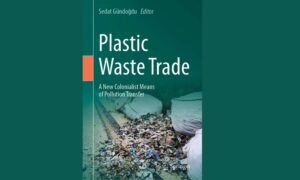Événement Virtuel
Launch and Panel Discussion | Plastic Waste Trade: A New Colonialist Means of Pollution Transfer

15 Avr 2024
15:00–16:30
Lieu: Online | Webex
Organisation: Basel Action Network, Geneva Environment Network
This event, launching a new book "Plastic Waste Trade: A New Colonialist Means of Pollution Transfer", is organized within the framework of the Geneva Beat Plastic Pollution Dialogues. The event discussed how the ongoing negotiations at the Intergovernmental Negotiating Committee to develop an international legally binding instrument on plastic pollution can address the problems inherent in the plastic waste trade.

About this Session
By the end of 2024, countries worldwide are expected to come to an agreement on how to manage plastic pollution, a transboundary problem exemplified in the movement of marine debris through ocean currents, and the movement of plastic through cross-border supply chains.
The book Plastic Waste Trade: A New Colonialist Means of Pollution Transfer takes a holistic view of the international waste trade and in doing so argues that the transfer of plastic waste from mainly Global North to primarily Global South countries constitutes a form of 21st Century colonialism. The authors take viewers through the history of the plastic waste trade – from toxic disasters in the 1970s and 1980s through the Basel Convention on the Control of Transboundary Movements of Hazardous Wastes and Their Disposal in 1989 – until China’s 2018 implementation of a “National Sword” policy effectively banned the importation of plastic waste and threw the plastic waste supply chains into disarray.
From there, the authors explore both the legal trade in plastic waste and the underground illegal trade in waste, arguing that both lead to devastating impacts on ecosystems, workers, and communities in receiving countries and highlighting how countries that receive waste are often less equipped to process it than the countries that export waste. The last section of the book presents cases from countries on the receiving end of the plastic waste trade, highlighting inherent problems from sociological and environmental justice perspectives.
What does this mean for the Global Plastic Treaty negotiations?
How can the ongoing negotiations at the Intergovernmental Negotiating Committee (INC) to develop an international legally binding instrument on plastic pollution, including in the marine environment, address the problems inherent in the plastic waste trade?
The speakers offered a sneak peek into the contents of the book, and deliberate over the opportunities for the Global Plastic Treaty to end waste colonialism.
Geneva Beat Plastic Pollution Dialogues

The world is facing a plastic crisis, the status quo is not an option. Plastic pollution is a serious issue of global concern which requires an urgent and international response involving all relevant actors at different levels. Many initiatives, projects and governance responses and options have been developed to tackle this major environmental problem, but we are still unable to cope with the amount of plastic we generate. In addition, there is a lack of coordination which can better lead to a more effective and efficient response.
Various actors in Geneva are engaged in rethinking the way we manufacture, use, trade and manage plastics. The Geneva Beat Plastic Pollution Dialogues aim at outreaching and creating synergies among these actors, highlighting efforts made by intergovernmental organizations, governments, businesses, the scientific community, civil society and individuals in the hope of informing and creating synergies and coordinated actions. The dialogues highlight what the different stakeholders in Geneva and beyond have achieved at all levels, and present the latest research and governance options.
Following the landmark resolution adopted at UNEA-5 to end plastic pollution and building on the outcomes of the first two series, the third series of dialogues will encourage increased engagement of the Geneva community with future negotiations on the matter.
Speakers
By order of intervention.

Sedat GÜNDOĞDU
Professor, Cukurova University, Türkiye

Peter STOETT
Dean and Professor, Faculty of Social Science & Humanities, Ontario Tech University

Jim PUCKETT
Executive Director and Founder, Basel Action Network (BAN)

Krista SHENNUM
Researcher, Climate Rights International

Jindřich PETRLIK
International Pollutants Elimination Network (IPEN)

Yuyun ISMAWATI
Senior Advisor and Co-Founder, Nexus for Health, Environment and Development Foundation (Nexus3) | IPEN Steering Committee Member

Magdalena DONOSO
Regional Coordinator for Latin America and the Caribbean, Global Alliance for Incinerator Alternatives (GAIA)

Griffins OCHIENG
Executive Director, Centre for Environmental Justice and Development | Co-chair, IPEN Toxic Plastic Working Group

Pui Yi WONG
Basel Action Network (BAN) | Moderator
Highlights
Video
Live on Webex
Summary
Pui Yi Wong from Basel Action Network began by expressing gratitude to the authors of the book » for partnering with the Geneva Beat Plastic Pollution Dialogues to discuss its findings. The dialogues aim to link ongoing multilateral efforts to tackle plastic pollution, particularly in light of the upcoming Intergovernmental Negotiating Committee (INC4) meeting to develop an international treaty on plastic pollution.
The event began by Sedat Gundogdu, editor of the book and Professor, Cukurova University, Türkiye, providing background information on the book, detailing its origins in research on microplastic pollution in the Mediterranean Sea. The investigation led to the discovery of illegal dumping of plastic waste in Turkey, primarily from European countries. Gundogdu explains the timeline of events, government responses, and ongoing challenges related to plastic waste importation and pollution. The book aims to shed light on the connection between plastic waste trade and waste colonialism, highlighting the environmental and social impacts of this phenomenon.
Peter Stoett, Dean and Professor, Faculty of Social Science & Humanities, Ontario Tech University, framed the issues of waste colonialism within broader historical patterns of colonialism and exploitation. He outlined a topology of waste colonialism, distinguishing between historical waste colonialism and waste neocolonialism, emphasizing the impact on environmental justice and sustainable development. Stoett described indirect waste accumulation and criminal waste trade as ongoing sources of harm within this context. He concluded with a discussion on waste decolonization and the need for limits to industrial growth.
Jim Puckett, Executive Director and Found of Basel Action Network, discussed the legislative efforts to prevent waste colonialism and toxic trade, focusing on the Basel Convention and recent amendments targeting plastic waste. He highlights the challenges in regulating waste trade and the drivers behind waste movement, including the global commons syndrome, lack of democracy and empowerment, and the greenwashing of terms like recycling and circular economy. Puckett emphasized the importance of preventing waste colonialism through legislative measures and transparency. He concluded by discussing the limitations of the current waste trade governance framework and the need to address the root causes of plastic waste production.
Krista Shennum, Researcher, Climate Rights International, and Jindřich Petrlik, International Pollutants Elimination Network, delve into the human rights and environmental impacts of the global waste trade, particularly focusing on plastic waste. Shennum discussed how plastic waste trade poses serious threats to human rights across its life cycle, from production to waste management. She emphasizes the lack of enforcement of environmental regulations in receiving countries, leading to human rights abuses. Workers, especially in the informal economy, face health risks due to exposure to toxins during recycling processes. Shennum highlighted a report documenting health impacts on workers in Turkey, a major recipient of plastic waste exports. She calls for a binding treaty to regulate plastic production and protect human rights.
Petrlik discussed toxic contamination caused by plastic waste in developing countries. He emphasized the release of hazardous chemicals at every stage of the plastic life cycle and the lack of global regulation for most plastic chemicals. Petrlik presented data on the export of contaminated plastic waste to developing countries, causing pollution and health risks. He mentioned studies on toxic contamination in various locations, including Ghana and Indonesia, and the pollution of food chains. Petrlik concluded by highlighting the contamination of recycled plastic with toxic additives, calling for urgent action to address this issue.
Overall, the presentations underscored the urgent need for global regulation of plastic production and waste management to protect human rights and the environment.
Yuyun Iswamati, Senior Advisor and Co-Founder, Nexus for Health, Environment and Development Foundation (Nexus3), then discussed the situation in Indonesia, highlighting the importation of plastic waste mainly from Western Europe and the subsequent environmental and health impacts caused by improper disposal methods such as burning.
Griffins Ochieng, Executive Director, Centre for Environmental Justice and Development, focused on Africa, emphasizing the threat posed by continued waste trade, particularly from the US, and the lack of adequate recycling infrastructure in African countries.
Magdalena Donoso, Regional Coordinator for Latin America and the Caribbean, Global Alliance for Incinerator Alternatives (GAIA), discussed the situation in Latin America, noting the influx of plastic waste from the US and the challenges faced by countries like Ecuador and Mexico in managing this waste.
Overall, the speakers called for the urgent need for a global treaty to address the plastic waste crisis, emphasizing the importance of reducing plastic production, enhancing recycling capacity, and holding both producers and importers accountable for their waste. They also highlighted the role of international conventions such as the Basel Convention but emphasized the need for stronger regulations and enforcement mechanisms in the new Plastic Treaty to combat plastic waste trade effectively.
Documents
Links
- Plastic Waste Trade: A New Colonialist Means of Pollution Transfer | Editors: Sedat Gündoğdu | Springer
- Towards Plastics Pollution INC-4
- Plastics and the Environment | GEN
- Plastics and Trade | Plastics and the Environment Series | GEN
- It’s As If They’re Poisoning Us. The Health Impacts of Plastic Recycling in Turkey | Human Rights Watch | 22 September 2022
